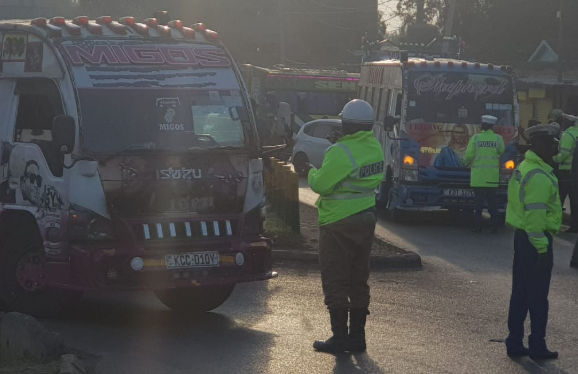Key access roads leading into Nairobi’s Central Business District (CBD) were blocked early Wednesday morning ahead of planned demonstrations meant to honour the victims of the 2024 anti-government protests.
The blockade, which took effect on the morning of June 25, 2025, has severely disrupted public transport, with passengers being forced to alight at designated drop-off points far from the city centre. Public Service Vehicles (PSVs) from various parts of the city were stopped from accessing the CBD. Vehicles from Mombasa Road were required to terminate at Haile Selassie Avenue and the Nyayo House roundabouts, while those from Thika Road concluded their trips at Globe Roundabout. PSVs from the Jogoo Road route ended their journey at City Stadium, forcing commuters to walk the remainder of the distance to the CBD.
The security apparatus was highly visible across the capital, with heavily armed officers deployed around key installations. A razor-wire fence was seen encircling the Parliament buildings as a precautionary measure to ward off any breaches during the protests.
Interior Cabinet Secretary Kipchumba Murkomen was reported to have interacted with police officers early in the morning as they prepared for deployment. He later expressed gratitude to the security personnel for their role in maintaining order and ensuring public safety during the demonstrations. He reaffirmed the government’s commitment to protecting the lives and livelihoods of all Kenyans, especially during such periods of heightened tension.
Murkomen acknowledged the struggles of ordinary Kenyans who were already on their way to work at the break of dawn and reassured the public that the state would ensure their safety. His remarks sought to strike a balance between recognizing the significance of the protests and affirming the rule of law and order.
National Police Service Inspector General Douglas Kanja addressed the nation a day prior, urging those planning to protest to do so peacefully and lawfully. He emphasized that police officers were under strict instructions to act within the law and would only intervene to protect lives and property. While he assured the public that the police would facilitate lawful demonstrations, he issued a stern warning against any attempts to provoke law enforcement or breach restricted areas.
Flanked by top security officials, including heads of key units such as the Directorate of Criminal Investigations and the General Service Unit, Kanja declined to take questions following his statement. Nonetheless, the overall message from the security sector was clear: the right to protest would be upheld, but only within the confines of the law and public order.

